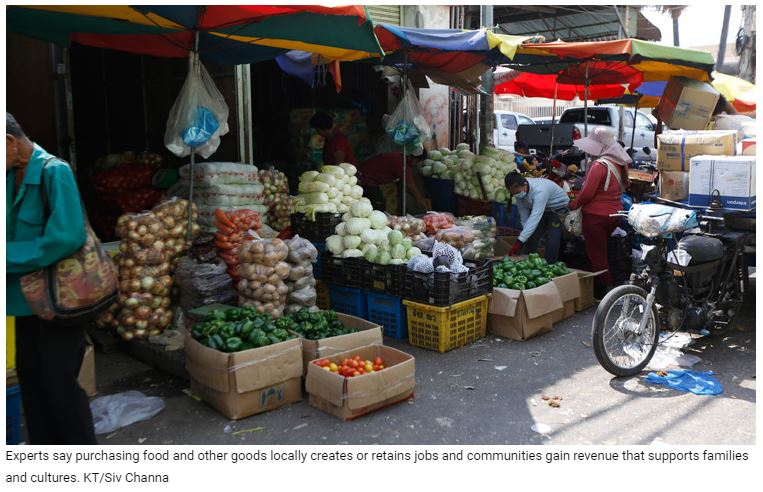Cambodia – UNDP: Buying local supports community economic resilience amid pandemic
According to a study by London-based economic think tank, The New Economics Foundation (NEF), buying produce at a local farmers market or community supported agriculture programme, versus from a supermarket, leads to around double the money spent remaining in the community.
“That means those purchases are twice as efficient in terms of keeping the local economy alive. Money is like blood. It needs to keep moving around to keep the economy going,” it added.
This is especially important in Cambodia, says UNDP Resident Representative Nick Beresford, especially amid the pandemic.
“Buying local has wide benefits for the economy. Local markets are supplied by local producers, which generates multiplier effects in various sectors, supporting local entrepreneurs and creating employment opportunities. Locally owned businesses usually employ more people per unit of sale and retain more employees over time. Local businesses re-circulate a greater share of every dollar because they create locally owned supply chains and invest in their employees, also increasing the velocity of money in the area. Local communities also receive benefits from buying local through increased employment and entrepreneurship opportunities.”
Beresford noted that buying locally is directly helping the economy to withstand the downturn by supporting a faster recovery at a time when the local economy has been under pressure in Cambodia due to COVID-19.
“We are also supporting income generation for local producers in lower income groups that are facing greater challenges due to the pandemic.”
He noted buying local also has additional environmental benefits.
“Local products have lower transportation costs and lower carbon footprints. They also use less packaging, producing less waste to be managed. In sum, buying local is an important way to accelerate economic recovery, promote economic growth and support jobs, livelihoods and sustainable development.”
Beresford said the Cambodian government’s rapid and successful roll out of stimulus measures has particularly helped support the recovery of the economy.
Market analysts the Green Business Bureau (GBB) also supports the range of benefits to shopping locally for communities.
“By purchasing food and other goods that are produced locally, you stimulate the economy in which you live. Jobs are created or retained, the community gains revenue and families and cultures are supported. Sourcing locally also reduces the transportation costs associated with your goods. Finally, it also presents a special networking opportunity among businesses. Choosing to buy from other businesses within your community can lead to new connections, special discounts and the chance to collaborate and support one another.”
However, the NEF said the point is not that communities should suddenly seek to be self-sufficient in all ways but, rather, it is a matter of improving economic resilience.
“Say, for example, exchange rates or the price of oil go up. This means importing foreign-made goods is no longer viable and businesses could become doubly stuck. While no community functions in isolation, supporting local trade helps create a diversity of small businesses that are flexible and can adjust to changing needs and market conditions.”
GBB added that the recent pandemic is a prime example of how a global crisis can shape market conditions and consumer buying habits – such as panic buying.
“In times of crisis and economic upheaval, it is critical for business leaders to learn from and adapt to such events. Together, with the support of their stakeholders, small and medium businesses can build resiliency and prepare themselves and their communities for future challenges.
In Cambodia, Beresford added that while immediate measures should focus on the most affected sectors and businesses, especially the tourism and garment industries, policies to incentivise investment in higher value-added services and production such as digital trade and assembly industries could be a strategic focus in the medium term. It will be critical to prioritise the most vulnerable and the local economy. Promoting people and businesses buying local could help to move in this direction.
Source: https://www.khmertimeskh.com/50817954/undp-buying-local-supports-community-economic-resilience-amid-pandemic/


 Thailand
Thailand




